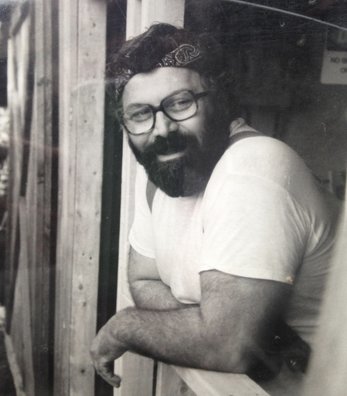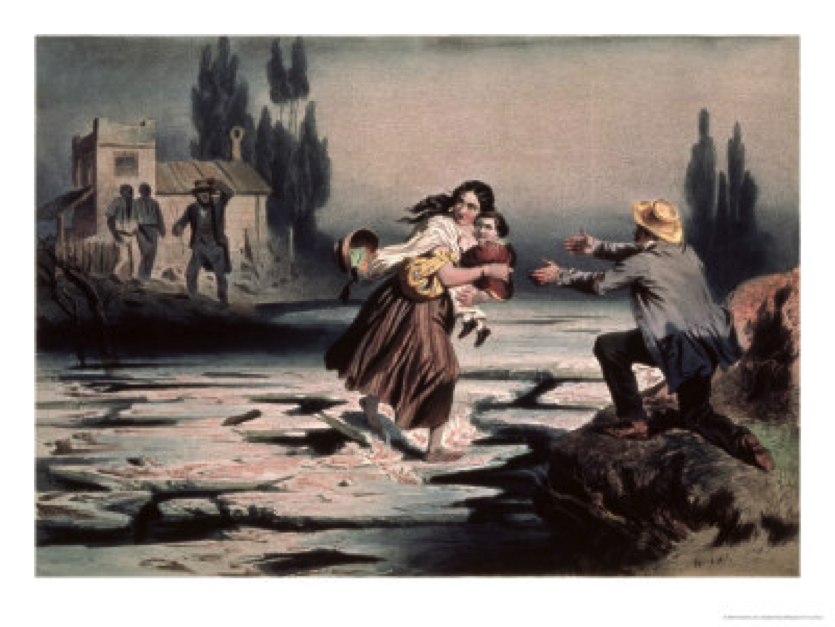 Vincent F. Parlato - early 1980s - my father The garbage truck roared it's way towards our house. My sister, Lisa, and I, jumped up from the couch to peek out the window. This was before the days of automated sanitation trucks that lift your plastic trash bin with a mechanical arm. Back in the day, it took real men all sweaty and muscled to hoist your trashcan by hand and dump it in the back of the truck. Men with youth, and vigor, ripped abs and brawny biceps in jeans and t-shirts clingy with perspiration. For two teen-aged country girls living in rural upstate New York, the weekly arrival of the garbage truck was a Junior Chippendales event.
My father, "Vinnie", chuckled at our gawking, amused with his oldest daughters and their newfound interest in the masculine form. "Who's out there today?" he said. Dad walked up to gawk out the window too. The truck halted at our driveway and two young men emerged and descended upon our trashcans. One was Black. One was White. "Hey, the moolie's here! " he cracked, laughing. "Daaaaad! Stop it!" my sister and I both said. Moolie. Short for "moulinyan", an Italian word meaning "eggplant". It is a derogatory term that refers to a Black person akin to using the "N" word in English. It was difficult to hear my father say this. Harder still to stop him from saying it. Some internal force tightened in my stomach. My dad was a first generation immigrant. His father emigrated from Sicily, landing at Ellis Island in the early 1900s during "The Great Arrival", an influx of southern Italians seeking a new life in America. Grandpa settled in Buffalo, New York. What I didn't know until years later was he entered into a society that, as it has been for decades, placed a value on how light your skin was. At that time, Italians, especially the dark, swarthy Sicilians, were viewed with malice and suspicion. In the South for many years they were labeled as "black" on census records, and even became the victims of lynching. The closer to "white" you were, the better your chance of obtaining employment, safety and acceptance. Italians and Blacks were in direct competition for jobs and upward mobility, so Italians made every effort to differentiate themselves from their African American counterparts. This was the atmosphere into which my father was born in 1932. There he assimilated all the contempt and condescension towards a people he considered to be his rivals in school, in society, and in life. I loved my dad. 6'3" with massive arms and legs like tree trunks. He was big and hairy and loud in language and laughter. His presence filled a room. I was safe with him, and I was sure he knew everything. I remember the day I found out he did wrong things sometimes. I was in first grade, sitting with my little girl friends around a cafeteria lunch table. Amid glass milk bottles and the crinkle of the wax paper around our sandwiches, we complained about boys, and Rodney in particular. "I don't like Rodney," said Nancy. "I don't like him either. He's mean," said Faith. "Me neither, " I chimed. "He's a real bastard." Collective gasp. "Uh ohhhhh!" said Shirley. " You said a swear word!" "No I didn't." I knew I hadn't. "Yes you did," said Janice. "That's a swear word!" "No it's not. My dad says it all the time." I sucked my teeth. What did they know! I was sure my dad would never swear. Until I went home and asked my mom. "Mom, is bastard a swear word?" "Yes, Susan, it is. You should never say it." Wow. My dad - swears. I was so crushed and confused. My dad is good. Why does he do this bad thing? As I grew older I eventually learned about slavery in America, the Triangular Trade, the Civil War and the tragic history of my country. As a New Yorker, I self-identified with the abolitionist leanings of "The North", wanting to disassociate myself from this brutal past. I was glad my genetic roots hailed from somewhere outside the US. I learned in school that oppression of Black people was identified as something immoral and destructive. But here in my own home, was this father I loved, who spoke so disparagingly about Black people. A father that said and thought "bad things." And then there was my mother, who taught me to never use the "N" word. How could my parents be so different? How could I reconcile all this in my heart? Young adulthood would bring further division, and further challenges to the contradictory beliefs in my head vying for definition. Enter the age of cognitive dissonance and it’s crucible of discovery. "Racism is still with us. But it is up to us to prepare our children for what they have to meet, and, hopefully, we shall overcome." - Rosa Parks
3 Comments
8/28/2019 06:43:40 am
People say that an old dog cannot learn new tricks, but that is not true. I have been an animal trainer for three decades now, and there is nothing that I cannot teach a dog. Dogs are skilled animals, regardless of their age, a dog can still learn a few tricks. Of course, the tricks that I am referring to are not as glamorous as the ones you are thinking. Simply put, an old dog can still learn a few tricks.
Reply
5/6/2024 11:42:03 pm
Routine veterinary visits are essential for monitoring your pet's health, detecting any underlying issues, and administering preventive care measures.
Reply
Leave a Reply. |
Susan Parlato RevelsArchives
June 2024
Categories
All
links to other sites
www.abuacademy.com
|

































 RSS Feed
RSS Feed